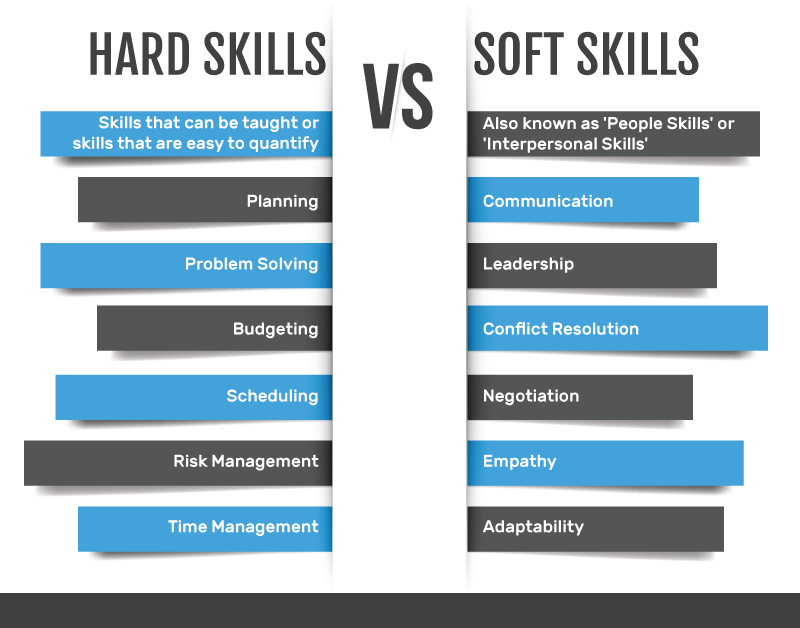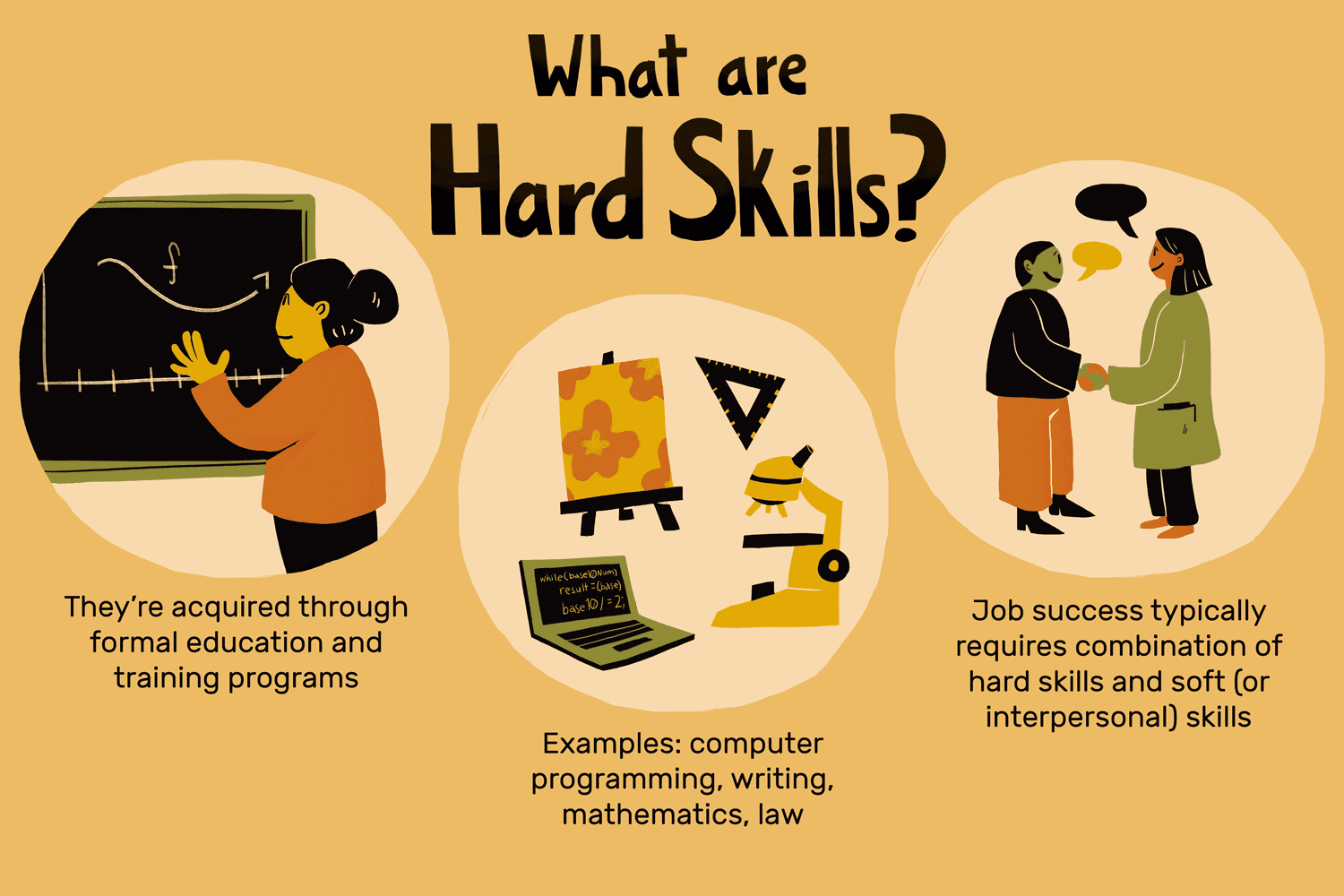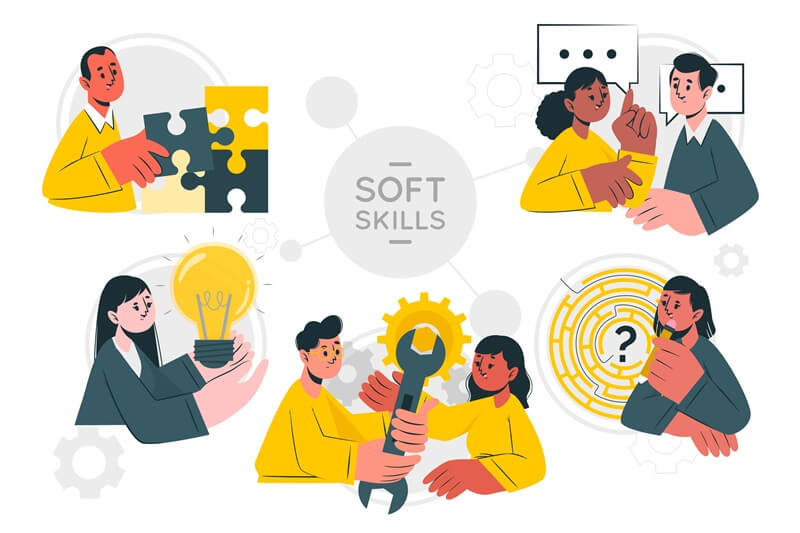Soft skills vs hard skills are two distinct categories of skills that individuals possess, each playing a crucial role in personal and professional development. While hard skills refer to specific technical abilities and knowledge acquired through education and training, soft skills encompass a range of interpersonal and communication skills that enable individuals to effectively interact with others. Understanding the contrast between these two skill sets is crucial for both job seekers and employers alike, as it can greatly impact one’s ability to succeed in the modern workforce. In this article, VTJ will discuss the fundamental differences between soft skills and hard skills, highlighting the significance of each in today’s competitive job market.
>>>Read more: Teacher Cover Letter Examples and Templates for Any Teaching Position
>>>Read more: 20+ Common teaching job interview questions & answers in Vietnam
What’s The Difference Between Soft Skills Vs Hard Skills?

What’s The Difference Between Soft Skills Vs Hard Skills?
Hard skills refer to specific technical abilities and knowledge that are typically acquired through education, training, or experience. These skills are often measurable and can be easily demonstrated or tested. Examples of hard skills include proficiency in programming languages, data analysis, accounting, or operating machinery.
On the other hand, soft skills are more intangible and relate to a person’s interpersonal and communication abilities. These skills are essential for effective collaboration, leadership, and problem-solving. Soft skills include traits such as communication, teamwork, adaptability, empathy, and critical thinking.
>>>Read more: 40+ ESL Teacher Interview Questions & Answers
While hard skills are crucial for performing specific tasks or jobs, soft skills are equally important for success in the workplace. Employers often seek candidates who possess a combination of both hard vs soft skills, as they contribute to a well-rounded and versatile employee. Hard skills may get someone hired, but soft skills are what often determine their long-term success and career progression.
>>>Read more: Teacher Strengths and Weaknesses: How to Answer?
What Are Hard Skills?

Soft Skills Vs Hard Skills: What Are Hard Skills?
Hard skills, also known as technical or tangible skills, are specific abilities that can be quantified, measured, and often acquired through formal education, training programs, or practical experience. These skills are typically job-specific and revolve around a particular set of knowledge or expertise. Unlike soft skills, hard skills are more concrete and directly applicable to a particular profession or industry.
>>>Read more: 40+ Preschool Teacher Interview Questions (+Answers)
Hard skills vary widely depending on the field and job role, but they play a crucial role in determining an individual’s qualifications for a specific position. They are often the prerequisites listed in job descriptions, as employers seek candidates who possess the technical competencies necessary to perform the tasks required for a given role.
>>>Read more: Why do you want to be a Teacher? 15+ Example Answers
What Are Soft Skills?

Soft Skills Vs Hard Skills: What Are Soft Skills?
Soft skills, often referred to as interpersonal or people skills, are the non-technical, personal attributes and qualities that individuals use to navigate social interactions, work effectively in teams, and enhance their overall professional and personal relationships. Unlike hard skills, which are specific to a particular job or industry, soft skills are highly transferable and are valued across various professions and contexts. These skills are essential for building strong workplace relationships, communicating effectively, and demonstrating emotional intelligence, all of which contribute to career success and personal growth.
>>>Read more: 40+ School Principal Interview Questions (And Example Answers)
Soft Skills Examples
Here are some examples of soft skills that are highly valued in the workplace:
Communication
- Effective verbal and written communication
- Active listening
- Presentation skills
- Negotiation and persuasion
Teamwork and Collaboration
- Cooperation and collaboration with colleagues
- Conflict resolution
- Building and maintaining relationships
- Flexibility and adaptability in a team setting
Leadership
- Decision-making
- Delegation and empowerment
- Motivation and inspiration
- Conflict management
Problem-solving
- Critical thinking
- Analytical skills
- Creativity and innovation
- Adaptability to change
>>>Read more: “What Are Your Salary Expectations?” – 10 Sample Answer
What Skills Are Employers Looking For?
Employers seek a balance of both hard skills vs soft skills when evaluating candidates. As demonstrated by numerous examples, the specific skills required vary based on the particular job and industry. In certain roles, robust soft skills can compensate for a deficiency in a recommended hard skill.
>>>Read more: 35+ Questions to Ask in A Teacher Interview to Impress Employer
Soft Skills Vs Hard Skills For Resume
Hard skills on your resume
- Certifications and training: Dedicate a section on your resume specifically for hard skills. List the technical proficiencies, certifications, and qualifications relevant to the job you’re applying for.
- Be specific: Provide concrete examples of your hard skills. Mention specific software programs, tools, or methodologies you’re proficient in. Quantify your achievements whenever possible.
Soft skills on your resume
- Incorporate soft skills in your achievements: Use your work experience section to subtly showcase your soft skills. Describe accomplishments that demonstrate teamwork, leadership, communication, or problem-solving.
- Objective statement or summary: In your resume’s summary or objective statement, mention a few key soft skills that make you a well-rounded candidate.
- Cover letter: Consider discussing your soft skills in your cover letter to provide context for your qualifications and personality.
>>>Read more: How Long Does It Take To Become a Teacher? (2023 Complete Guide)
>>>Read more: How to Write a Letter of Recommendation (Tips And Examples)
How To Highlight Your Soft Skills Vs Hard Skills Throughout The Interview Process
During the interview process, it is crucial to effectively highlight both soft vs hard skills to demonstrate your suitability for the role. Here are some tips:
- Research the job requirements: Understand the specific skills and qualities the employer is seeking for the position and prepare examples that showcase your proficiency in those areas.
- Prepare specific examples: Be ready to provide specific examples from your past experiences that demonstrate your soft skills in action. These examples can be from previous work, volunteer experiences, or even personal projects.
- Use the STAR method: When answering behavioral interview questions, use the STAR method (Situation, Task, Action, Result) to structure your responses and provide clear examples of how you utilized both soft and hard skills to achieve positive outcomes.
- Connect skills to the job: Throughout the interview, make connections between your skills and the requirements of the job. Explain how your soft skills and hard skills make you a strong fit for the position and how they can contribute to the success of the company.
Example
Here’s an example of an answer that uses the STAR method:
- Situation: During my tenure as a sales associate, a colleague unexpectedly resigned just before a crucial project deadline.
- Task: Given the circumstances, I was entrusted with taking over the project and completing several weeks’ worth of work within a compressed time frame.
- Action: Recognizing the need for efficient collaboration, I approached my manager and requested a temporary reduction in my regular responsibilities for the week. Simultaneously, I delegated specific tasks to other members of the sales team, ensuring a collective effort. To familiarize myself with the project requirements, I dedicated two days to studying its intricacies and refreshing my Excel skills. Together with my intern, we devised a strategic plan to accomplish the assignment within a five-day timeframe.
- Result: Through diligent effort and focused dedication, I successfully completed the project on time and with a high level of accuracy. My manager acknowledged and appreciated my commitment to the task, subsequently entrusting me with additional projects based on my demonstrated capabilities.
>>>Read more: Motivation Letter: How to Write & Examples in 2023
>>>Read more: How to Become a Teacher Without a Degree – A Complete Guide
Understanding the distinction between soft skills vs hard skills is a pivotal step in advancing your career and making a lasting impact in today’s professional landscape. While hard skills provide the technical proficiency needed to excel in specific job roles, soft skills serve as the foundation for effective communication, collaboration, and personal growth. Striking the right balance between these skill sets can be the key to not only landing your dream job but also thriving within your chosen field.
FAQs
How many hard skills and soft skills can a resume have?
The number of hard and soft skills on a resume can vary depending on the job and the candidate’s qualifications. It’s essential to include the most relevant skills for the position you’re applying for, typically ranging from 5 to 15 skills in total.
Which is more important between hard skills and soft skills?
The importance of hard skills versus soft skills depends on the job and industry. In technical or specialized roles, hard skills may be more critical, while in roles that require teamwork and communication, soft skills often take precedence. Both types of skills are valuable, and their importance varies by context.
Is it easier to learn hard or soft skills?
The ease of learning hard or soft skills varies from person to person and depends on the skill itself. In general, hard skills may require more formal education or training, making them structured but potentially time-consuming to acquire. Soft skills can be developed through practice, self-awareness, and interpersonal interactions.
How long does it take to learn a new skill?
The time it takes to learn a new skill depends on several factors, including the complexity of the skill, your prior knowledge and experience, and the resources available for learning. Learning a basic hard skill might take a few weeks, while mastering a complex one could take months or even years. Soft skills development is ongoing and can be refined over a lifetime.
What are some ways you can learn hard skills?
There are several ways to learn hard skills, including formal education, online courses, workshops, on-the-job training, and self-study. It’s essential to choose a method that aligns with your learning style and the specific skill you want to acquire.
🌟 Are you facing difficulties in finding and securing teaching positions in Vietnam? Are visa procedures causing you trouble? Feeling overwhelmed and directionless upon your arrival in Vietnam for teaching assignments? Don’t worry, VTJ’s English Teaching Placement in Vietnam (EPIV) Program 2024 provides comprehensive support to solve ALL the matters.
👉👉👉 Click HERE to request free consultation.



